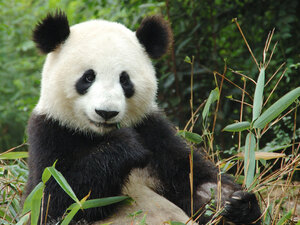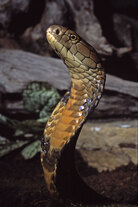
The Animal Review: The Genius, Mediocrity, and Breathtaking Stupidity That Is Nature
By Jacob Lentz and Steve Nash
Hardcover, 144 pages
Bloomsbury USA: $12
Read An Excerpt
For too long, Jacob Lentz thinks, certain animals have gotten by on good looks and charm, while more impressive species are ignored by children and stuffed-animal manufacturers.
A couple of years ago, Lentz and friend Steve Nash set out to right this wrong. They began a blog called Animal Review.
It's exactly what the name implies: reviews of critters, not unlike reviews of cars or new gadgets, complete with letter grades. The ladybug gets an A-. The bald eagle gets a C+.
Their blog has now become a book, also titled The Animal Review. Lentz tells NPR's Linda Wertheimer that being a good animal critic is "more of an art than a science."
"It takes at least two years of blogging to really get good at this," he says. "I can't expect laypeople to just start judging animals accurately. It's probably best left to me and Steve."
Part of that professional skill involves knowing which animals not to tick off. "I'm not going to be the one who gives the king cobra a B+," Lentz says. "And I have no interest in upsetting a great white shark. I only have good things to say about those animals.
"If they're listening, I just want to tell them that I think they're amazing. And whatever they want to do is great," he continues. "There's a ton to recommend them to anyone, whether they're planning to kill you or not."

Panda: F
"Pandas have absolutely no interest in reproducing. They rarely mate," Lentz says. That goes against the raison d'etre of a species. "We spend all this money flying these animals around the world, trying to convince them to mate, and we could spend it on a lot of other stuff.
"Second of all, they eat bamboo. They're not supposed to eat bamboo. Their bodies are not adapted to digest cellulose, but they hang in there with the bamboo. But the result of that is that they have to eat a ton of bamboo," he says. "They don't have a lot of energy to do things, like to mate.
"That could be Nature kind of hinting around the fact that they should collectively shuffle off this mortal coil."

Octopus: A
"We gave the octopus an A because it would make a great superhero. They're supersmart, they can solve puzzles, they can remember things.
"They can change their bodies, so they can slip through tiny crevices," Lentz adds, "and they shoot ink. There's all sorts of cool stuff with the octopus that doesn't get talked about enough — because we're spending all our time talking about pandas."

King Cobra: A+
"The king cobra, largest venomous snake, makes nests. It's the only snake known to make nests, and good for them. I mean, great. I think that's amazing. They can inject enough venom to kill an elephant. You have to respect that."
http://www.npr.org/templates/story/story.php?storyId=125773728








No comments:
Post a Comment